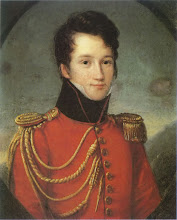RELIGION
T
|
he
question of whether we survive death is surely the most important one that can
occur to us. Yet almost nobody is concerned with it. With the decline of
Christianity, Western civilisation now ignores it completely. As a result,
people go blindly into death and are reborn at hazard.
J.S. Bach, Mozart, Schubert and
Brahms came to my bedside one night in a dream and told me they were all the
same entity. The next day I looked up their birth and death dates in Groves
One of the most interesting aspects
of W.B. Yeats is his firm belief in reincarnation. He was determined to be
reborn, even if it meant being “pitched into the frogspawn of a blind man’s
ditch / A blind man battering blind men…” He had failed to understand the
message of the Upanishads – which he
helped translate – that one should strive not to be reborn. Was he reborn as a
poet? If so, as who? I feel that he became another Irish Nobel Prize winner,
Seamus Heaney, b.1939 in County
Derry
When a child is born, the Balinese
immediately put to it the question “Who eats the rice?” meaning, “Who were you
in your previous life?” No child has ever been known to answer, yet the
question is still asked. Why? Because the Balinese believe that a newborn
infant can often understand Balinese, since it is likely to have been a
Balinese in its previous life. They therefore ask the question to remind the
child not to forget the lessons learnt during its previous life, which would
otherwise have been led in vain. No anthropologist has yet explained this,
though most of them have remarked on the absurdity of the practice.
All of us underestimate the
importance of the vasanas, the scars
and blemishes left upon us by our past lives. Sometimes these are bodily,
sometimes mental. The worst scar or blemish is on the soul itself.
These days I find myself
increasingly preoccupied with my next incarnation. It feels like the way I used
to map out my career when young.
Choosing one’s next mother is a very
serious matter, requiring years of preparation. Unfortunately, one cannot
choose one’s father. One can only hope that if one’s choice of a mother is
sound, she will have the sense to choose a decent husband.
Ian Stevenson has shown that those
who die violent deaths not only tend to remember their previous lives but
suffer from phobias and somatic scarring, often of a disfiguring nature,
because of the deaths they have undergone. Either this is part of their karmic
punishment or the universe is even nastier than we imagine. To adapt J.B.S.
Haldane’s famous remark: “The universe is not only nastier than we imagine; it
is nastier than we can imagine”. This was the Buddha’s insight. No wonder he
compared existence to a burning house.
Compassionate people are often unhappy, for the cruelty, suffering and injustice of the world horrifies them. If they became enlightened, they would no longer be unhappy, for they would understand that only such a world can produce enlightenment.
Compassionate people are often unhappy, for the cruelty, suffering and injustice of the world horrifies them. If they became enlightened, they would no longer be unhappy, for they would understand that only such a world can produce enlightenment.
“A belief in reincarnation changes
one’s attitude to literature. For one thing, tragedies are no longer seen as
purely tragic. Macbeth, Hamlet, Lear, Romeo and the others should have all
learned lessons which will enable them to cope better next time they are reborn.
Lear, for example, should have learnt not to judge people on their words alone
and to pay more attention to a daughter who cannot have her heart into her
mouth”. So my Buddhist friends argue, sounding like Victorian moralists. I am
thankful, however, that I can forget my own belief in reincarnation when I am
watching Shakespeare.
If I keep reincarnating, where will
I be a billion years from now? For that matter, where was I a billion years
ago? Living and suffering pointlessly in another universe or another galaxy?
Immortality is no joke. And neither is death after death.
Watching The Blue Planet, a TV series about life in the oceans, I was once
again struck by the thought that everything on this planet is designed to eat
and be eaten. Watching the endless eat-or-be-eaten existence of the denizens of
the sea, I was dismayed by the hideous pointlessness of it all. Is this a penal
planet? Or a purgatorial one? Or simply – a terrifying thought – like most of
the other planets in the Multiverse? As the Buddhist verses run:
These
slowly drifting clouds are pitiful.
What
sleepwalkers we are!
Awakened,
the one great truth –
Black rain
on the temple roof.
This
poem never fails to move me. The last line, in particular, has a power that has
seldom been equalled in literature.
“God sees the truth, but waits”,
runs a Jewish proverb. The truth is, He often appears to procrastinate. Perhaps
He is too busy running the Multiverse?
Alfred North Whitehead once defined
religion as “What a man does with his leisure time”. (Collecting stamps,
perhaps?) This asinine remark, coming from a man of Whitehead’s towering
intellectual stature, reminds us that even geniuses can be fools at times. It
brings to mind Newton
COPYRIGHT (C) 2010 J D FRODSHAM




No comments:
Post a Comment